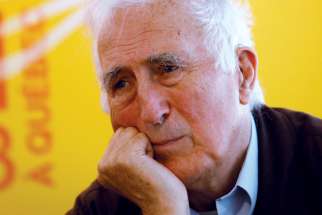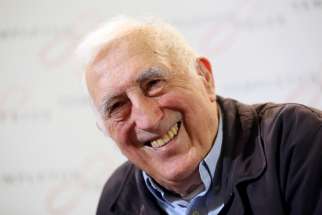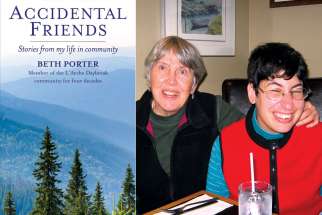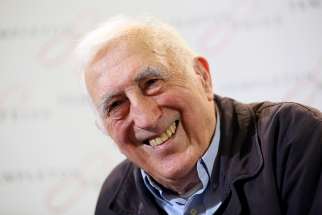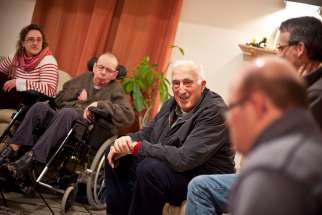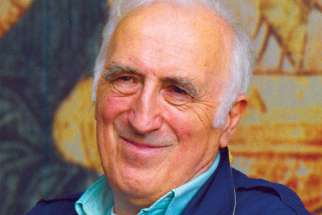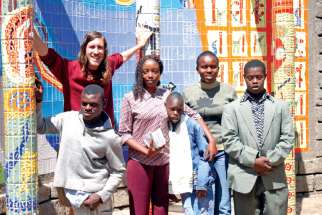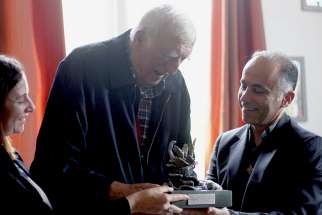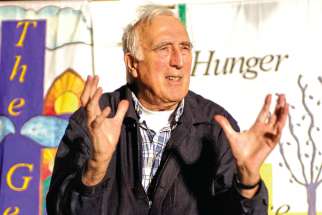Making L’Arche work during trying times
VANCOUVER -- Nineteen people with developmental disabilities and their assistants live in homes run by L’Arche Greater Vancouver, an organization founded on principles of intentional community and family-like living.
Vanier: The sad, awful truth
TORONTO -- For the adults with disabilities who are the core members of L’Arche, news that Jean Vanier sexually abused six women over a 35-year period hit particularly hard.
University of Notre Dame revokes awards given to L'Arche founder Vanier
SOUTH BEND, Ind. -- The University of Notre Dame Feb. 23 revoked the Notre Dame Award that was conferred upon Jean Vanier in 1994 after the L'Arche organization he established found credible allegations that Vanier sexually exploited six women.
Charles Lewis: Jean Vanier news stirs heartbreak … and anger
The Catholic world in Canada is reeling with the news that Jean Vanier, founder of the ecumenical L'Arche communities that provide group homes and spiritual support for people with intellectual disabilities, used his status to have "manipulative" sexual relationships with at least six women.
Author opens door to L’Arche’s world
Last year marked the 50th anniversary of L’Arche’s first community outside of France, L’Arche Daybreak, in Richmond Hill, Ont., and, sadly, it also saw the death of L’Arche’s visionary founder, Jean Vanier, in May.
For both of those reasons, L’Arche has been in the headlines to an unprecedented degree, and people around the world have been discovering both the movement and its founder, finding inspiration in its model of inclusive community life for people with intellectual disabilities.
To really grasp what life in L’Arche looks and feels like from the inside few could be a better guide than Beth Porter. Porter’s initial experience of L’Arche took place on the Labour Day weekend of 1980. She joined the community full-time in 1981 and has been an eyewitness to nearly 40 of the 50 years L’Arche Daybreak has existed. In this book — half-chronicle and half-love letter — she shares the growth and evolution she has seen in the community, and the transformations the community has evoked in herself.
Porter arrived at L’Arche as a young university graduate and teacher, searching for spiritual meaning and eager for community. She had explored great religious and mystical thinkers through her undergraduate years. She had gone to Trinidad to teach with Canadian University Service Overseas (CUSO) and had returned knowing that she wanted to make a difference in the world. Her journey led her first to the Anglican Church and then to Catholicism and repeated encounters with Jean Vanier’s writings about community.
She decided to see whether L’Arche might be a good fit for her and vice-versa. Her answer came in the form of a 38-year journey of discovery. She leads readers through the friendships and daily activities, the frequent joys and occasional frustrations, that are the threads of a remarkable tapestry that today includes 31 Canadian communities and more than 150 around the world.
Porter introduces us to dozens of people who have been part of the L’Arche communities she has lived in, whether they are core members (men and women with some degree of intellectual disability), assistants (those who live with them, offering support and friendship), volunteers, leaders and friends of the community. She has remarkably detailed memories, which allows her to sketch out personalities, events and conversations — capturing both the way things unfolded and her own impressions and reactions. She speaks lovingly and candidly about members of the community, their gifts and contributions and, occasionally, their shortcomings and quirks. She recalls moments of shared joy and laughter and recounts times of pain and awkwardness.
She gives us access to a double inner life — the life of L’Arche (especially at Daybreak) and her own inner life as she is stretched by people and events over four decades. Her stories inspire laughter and admiration, but she doesn’t hesitate to admit the rough edges that are also part of living in community. She includes her own mistakes, conflicts and misunderstandings, moments of doubt and questioning — so much so that the reader sometimes has the uncomfortable sense of reading someone else’s diary with all its intimate and deeply personal revelations.
There is an obviously tender love for L’Arche and the people who have accompanied her on that journey.
As Porter repeatedly highlights, Vanier’s vision was of people doing things with and not for others. It is a life of normality, where each person makes their own contribution, both giving and receiving.
These stories are touching and evocative, and they make up the substance of this book. There are two other elements, however, that I think highlight key aspects of L’Arche Daybreak. First is Porter’s inclusion of a chapter about the late Henri Nouwen. During his life and perhaps even more since his death in the fall of 1996, Nouwen has been recognized as one of the great spiritual writers of the past 50 years.
Porter knew Nouwen personally, as L’Arche’s pastor, as a community member and as an intellectual she could engage with on the level of spirituality and ideas. She presents Nouwen three-dimensionally and honestly, highlighting how he helped to shape today’s Daybreak and how L’Arche shaped him as a human being and priest.
Related to this is a second element — L’Arche’s ability to be both a Catholic community and an open, ecumenical and interfaith one. Vanier came from a profoundly Catholic upbringing, which left its imprint on his worldview and spiritual outlook. But, as Porter repeatedly underscores, L’Arche has never been denominational or chauvinistic.
Its worship moves comfortably between Catholicism, Anglicanism, the United Church and the ecumenical Taizé community. Porter herself has been actively involved in Christian-Jewish dialogue and has studied Judaism extensively. Daybreak’s chapel décor includes a painting of a mosque, with the first verse of the Qur’an written in Arabic.
L’Arche’s radical welcome and inclusivity extends to the spiritual realm, where people seek to respect each other and learn wisdom from them. In that sense, L’Arche is a parable of what is possible and needed in our fractious, competitive world.
Accidental Friends is an ideal title for this book. Many of its characters came into Porter’s life unexpectedly and unintended, yet her book makes clear how those friendships were providential and life-changing. This book is a tribute to how openness to friendship can transform us.
It is an invitation to discover our full humanity. It is filled with gentle, spiritual wisdom and a cast of characters who remind us why L’Arche is such a special gift to the Church and why L’Arche Daybreak is such a precious gift to us here in Canada.
(Watson is a Catholic Scripture scholar and interfaith educator. He is the Adult Faith Formation Animator for the Simcoe Muskoka Catholic District School Board and has been a friend of the L’Arche movement for many years.)
Accidental Friends: Stories From My Life in Community
by Beth Porter
Novalis, softcover, 275 pages
$22.95
Centre puts new light on Vanier’s life work
The ideas of one of the great Canadian Catholic thinkers of our time will live on at King’s University College which has been chosen to house the new Jean Vanier Research Centre.
Editorial: A saint for our times
Jean Vanier, Canadian writer, philosopher and humanitarian who died May 7, was a champion for people with intellectual disabilities and touched countless lives through his constant message of love.
ABOARD THE PAPAL FLIGHT FROM NORTH MACEDONIA - Pope Francis told reporters May 7 he had been kept informed about Jean Vanier's failing health and had phoned him a week before his death.
WASHINGTON - The death of Jean Vanier, whose ministry helped improve the lives of developmentally disabled people in dozens of countries, drew prayers and words of condolence from church leaders around the world.
Jean Vanier, founder of L'Arche, dies at 90
Looking at the world through L’Arche eyes
Jean Vanier offers a life lesson in his memoir
At 90, Jean Vanier is something more than an eminent man of great accomplishment, more than a national treasure who belongs to the Order of Canada, the Order of Quebec, France’s Legion of Honour and holds the 2015 Templeton Prize.
L’Arche ready to build a new beginning in Burnaby
VANCOUVER – A community built around love for people with developmental disabilities is undergoing ground-breaking changes.



